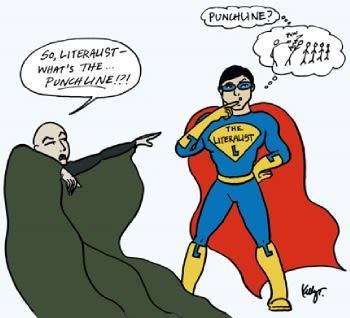Translation Archetypes: Which One(s) Are You?
– By Oliver Simões
“Comedy was all ever I wanted.” – Margaret Cho
“To truly laugh, you must be able to take your pain, and play with it.” – Charlie Chaplin
“You don’t stop laughing because you grow old. You grow old because you stop laughing.” – Michael Pritchard
“If u can’t laugh at yourself, you are not having fun. Don’t take things so serious. Smile” – Justin Bieber
Before we begin, here’s an article that explains what an archetype is.
A note on political correctness:
In this article, I chose to use “he,” “his,” and “him” when referring to a translator in general. I decided not to use slashes or plural forms. Regardless, I am referring to translators as a whole, without considering their gender or identity.
Translator Archetypes
The following archetypes originated from my observations and experience as a translator, as well as from reading and listening to other people’s stories. By all means, these archetypes are not indicative of a permanent or unchangeable state. Rather, they should be interpreted as an indication that we all may have had our moments of one or another type. We might, however, have a dominant archetype we more closely identify with. Which one(s) are you?
The Balanced One
 The Balanced type is knowledgeable and always tries to translate for meaning, taking into consideration cultural and linguistic issues in both source language (SL) and target language (TL). He is sensitive to stylistic differences and is keenly aware of the different registers; he understands that there’s never just one translation; there are many potential translations in the making, and each must be tailored to the intended audience. He avoids guesswork when translating. His goal is to convey the same meaning from SL to TL and anything short of that is unacceptable. The Balanced translator knows that certain concepts/terms are untranslatable and has no problem adding a footnote when needed and where fitting.
The Balanced type is knowledgeable and always tries to translate for meaning, taking into consideration cultural and linguistic issues in both source language (SL) and target language (TL). He is sensitive to stylistic differences and is keenly aware of the different registers; he understands that there’s never just one translation; there are many potential translations in the making, and each must be tailored to the intended audience. He avoids guesswork when translating. His goal is to convey the same meaning from SL to TL and anything short of that is unacceptable. The Balanced translator knows that certain concepts/terms are untranslatable and has no problem adding a footnote when needed and where fitting.
 The Literalist
The Literalist
As the name suggests, he has a tendency to translate things literally. Let’s say he’s translating an English literary passage that refers to a cat’s “nine lives” and he renders it in Portuguese word for word: “nove vidas” [ lit. “nine lives”]. Well, we have a problem here because in Portuguese a cat has SEVEN lives!
Here’s a real-life example from Portuguese into English. The term in question was confecção de bolsa em aorta in the context of a heart surgery. In the hands of a Literalist, the translation became purse manufacturing. No kidding! The correct translation would have been an aortic purse-string suture. Wow! Not even by a close shave.
Some funny signs from English to Spanish, or vice versa, found in a HuffPost slideshow:
| English | Spanish | Correct Translation |
| Exit Only | Éxito Aquí | Solamente salida |
| No Swimming | Ninguana Natación | Prohibido nadar |
| Construction Site: Keep Out | La Construcción Sitio: No Entrar | Zona de obras: Prohibido la entrada |
| Please turn off showers when you are done. | Por favor, vuelta lejos chaparrones cuando usted es hecho. | Por favor, apague las duchas cuando haya terminado. |
Here are some examples from English into Portuguese:
| English | Portuguese | Correct Translation |
| call back | ligar/telefonar para trás | retornar a chamada, ligar/telefonar de volta |
| inaugural address | discurso inaugural | discurso de posse |
| make a mistake | fazer um erro | cometer um erro |
| make no mistake | não faça erro | não se engane |
| make progress | fazer progresso | realizar avanço |
| make your business grow | fazer o seu negócio crescer (ambiguous) | fazer sua empresa crescer, fazer seu negócio prosperar |
This is from AskReddit: “What are some literal translations from your language into English?”
Answer: “My favorite German word is Antibabypillen for birth control pills.” (emphasis added)
Note: That’s how the Germans call the contraceptives; not exactly a literal mistranslation! Perhaps a good example of explicitation!
 The Minimalist
The Minimalist
The Minimalist loves to “trim the lard”; in other words, he cuts down everything in the translation that he deems as unnecessary. He prefers a simpler text without embellishments or details, even if they are part of the source text. For example, “the wounded, exhausted, sick soldier” might become “the wounded soldier”.
When translating movie subtitles, he avoids repetitions and he probably doesn’t care much about non-verbal fillers!
The Inattentive
 The Inattentive is exactly what the name says. He doesn’t pay attention to important things such as the content he’s translating, let alone insignificant details like grammar, punctuation, or even meaning! The target audience is not his priority. For example, if he’s translating for an American audience, he uses centimeters and kilos, and if he’s translating for much of the world, he uses inches and pounds. No compass or sense of direction! Localization is a word he never heard of – or if he did, he let it slip by.
The Inattentive is exactly what the name says. He doesn’t pay attention to important things such as the content he’s translating, let alone insignificant details like grammar, punctuation, or even meaning! The target audience is not his priority. For example, if he’s translating for an American audience, he uses centimeters and kilos, and if he’s translating for much of the world, he uses inches and pounds. No compass or sense of direction! Localization is a word he never heard of – or if he did, he let it slip by.
The Inattentive is normally oblivious to the context. A friend of mine, whose husband worked as a Portuguese translator and interpreter for several decades, told me a funny story that I’m going to use to make my point:
An interpreter was interpreting on the subject of bovine reproduction and the speaker referred to “frozen semen” for purposes of artificial insemination. While he was interpreting, his colleague was taking a break and not paying much attention to what was going on. When the time came for the daydreamer to take over, the same terminology came up, which he quickly translated as “frozen seamen”. Everybody in the audience started laughing.
Another example from the Huffpost slideshow:
English: Driver Wanted
Spanish: Se necesita delivery guy
The Comedian
 The Comedian advises his client(s) to refrain from using jokes when addressing people in another culture. He knows that jokes normally don’t translate well cross-culturally since they are often bound by the culture where they originated – and a foreign audience may think they are just not funny. The Comedian, however, allows himself to be goofy. Let me illustrate the point by using an anecdote that was passed on to me by someone who knew this interpreter. Picture a serious person being naughty; that was him at the time. To protect his identity, I’m using an alias:
The Comedian advises his client(s) to refrain from using jokes when addressing people in another culture. He knows that jokes normally don’t translate well cross-culturally since they are often bound by the culture where they originated – and a foreign audience may think they are just not funny. The Comedian, however, allows himself to be goofy. Let me illustrate the point by using an anecdote that was passed on to me by someone who knew this interpreter. Picture a serious person being naughty; that was him at the time. To protect his identity, I’m using an alias:
Mathias was called to interpret for an American businessman in Brazil who didn’t speak a single word of Portuguese. He told the guy to avoid using jokes because Brazilians would not understand and would not laugh. Contrary to Mathias’ recommendation, the businessman decided to include his joke anyway. When Mathias found out, he addressed the audience – in Portuguese – before the conference began and asked them to laugh as soon as the guy finished his “joke”. They agreed on a specific verbal cue that would signal when it was the right time to laugh. When the time came, the attendants got up from their chairs and went into a series of laugh attacks. They were rowdy – perhaps more so because of the prank that they were being a part of. The speaker turned to the interpreters’ booth and said with a triumphant smile on his face, “You see? They understood my joke!”
The Narcissist
 He thinks that his translation is THE translation. After completing an assignment, he takes pleasure in reading his masterpiece over and over again to himself. First, because he loves the sound of his voice and secondly because it’s a masterpiece that HE created. Forget about the author! The narcissistic type knows how to take ownership. Just like Narcissus, he has a problem acknowledging that other possibilities (or people) may exist. The narcissist is a talker, never a listener. He has trouble acknowledging other people’s talents and he hardly ever compliments someone on a job well done. In essence, he thinks he’s the cream of the crop. He’s greedy about his translations, of which he’s the author, editor, and proofreader. He hardly ever answers terminology questions, but he asks lots of them. And when someone helps him, he “forgets” to say “thank you” – or award them points.
He thinks that his translation is THE translation. After completing an assignment, he takes pleasure in reading his masterpiece over and over again to himself. First, because he loves the sound of his voice and secondly because it’s a masterpiece that HE created. Forget about the author! The narcissistic type knows how to take ownership. Just like Narcissus, he has a problem acknowledging that other possibilities (or people) may exist. The narcissist is a talker, never a listener. He has trouble acknowledging other people’s talents and he hardly ever compliments someone on a job well done. In essence, he thinks he’s the cream of the crop. He’s greedy about his translations, of which he’s the author, editor, and proofreader. He hardly ever answers terminology questions, but he asks lots of them. And when someone helps him, he “forgets” to say “thank you” – or award them points.
 The Envious
The Envious
The envious is a little green-eyed monster who can’t stand other people’s successes and triumphs. He is pretty much a complainer, one who disagrees on almost everything that others have produced. He may or may not have a favorite person to pick on. He hates it when a peer wins a translation contest, prize, or recognition because, like Salieri in Amadeus, he wants to be the maestro, but deep down he knows he will never get there since he’s guided by the destructive power of his envy and ignorance.
The Know-It-All
 As the nearest kin to the narcissistic, Mr. Know-It-All thrives on showing off his intellectual prowess. He never admits that someone may know more than he does. This is unthinkable in the mind of a Know-It-All; it’s a blow to his self-esteem. Deep down, a Know-It-All has an inferiority complex, so he masks this feeling by projecting his insecurities onto a false notion of intellectual superiority. He may not know a thing, but he pretends he does. He may, on the other hand, have a genuine interest for knowledge and devour encyclopedias, book after book, and perhaps even the phone book, which he can recite from beginning to end. (Don’t you hate my sense of exaggeration?) For the Know-It-All, the number of points or credits he amasses is more important than the final product!
As the nearest kin to the narcissistic, Mr. Know-It-All thrives on showing off his intellectual prowess. He never admits that someone may know more than he does. This is unthinkable in the mind of a Know-It-All; it’s a blow to his self-esteem. Deep down, a Know-It-All has an inferiority complex, so he masks this feeling by projecting his insecurities onto a false notion of intellectual superiority. He may not know a thing, but he pretends he does. He may, on the other hand, have a genuine interest for knowledge and devour encyclopedias, book after book, and perhaps even the phone book, which he can recite from beginning to end. (Don’t you hate my sense of exaggeration?) For the Know-It-All, the number of points or credits he amasses is more important than the final product!
The Guesser
 Unlike the Know-It-All who knows everything, the Guesser knows he doesn’t know, but that won’t keep him from giving an opinion or answering the most difficult term questions. After all, for the Guesser translation is a guessing game. And in this wheel of fortune, he always has an answer to everything. Of course, accuracy is not his main concern, but the thrill of getting those points and winning the game. Who cares if the guessed answer gets picked and an entry error is made in the glossary? That’s irrelevant for the Guesser and those who think alike. Can’t think of a Guesser? Start paying attention and you’ll be surprised!
Unlike the Know-It-All who knows everything, the Guesser knows he doesn’t know, but that won’t keep him from giving an opinion or answering the most difficult term questions. After all, for the Guesser translation is a guessing game. And in this wheel of fortune, he always has an answer to everything. Of course, accuracy is not his main concern, but the thrill of getting those points and winning the game. Who cares if the guessed answer gets picked and an entry error is made in the glossary? That’s irrelevant for the Guesser and those who think alike. Can’t think of a Guesser? Start paying attention and you’ll be surprised!
The Tech-Savvy
 Not only does this guy have all the CAT tools you can possibly imagine, he pays a great deal of attention to translation memories and other types of software that will increase his productivity on the job. He invests in technology because he knows that in today’s market, a translator doesn’t have much to gain unless he’s ahead of the game! The Tech-Savvy just doesn’t buy stuff, he also learns how to use it. Because he’s technologically inclined, he may not need to attend those boring how-to webinars, but he will if need be. The Tech-Savvy thinks it’s important to have a social media presence, so he is on a number of platforms, such as Facebook, Twitter, Instagram, YouTube, and possibly other channels. His priority is to maximize production, make himself visible and, in doing so, increase his earnings!
Not only does this guy have all the CAT tools you can possibly imagine, he pays a great deal of attention to translation memories and other types of software that will increase his productivity on the job. He invests in technology because he knows that in today’s market, a translator doesn’t have much to gain unless he’s ahead of the game! The Tech-Savvy just doesn’t buy stuff, he also learns how to use it. Because he’s technologically inclined, he may not need to attend those boring how-to webinars, but he will if need be. The Tech-Savvy thinks it’s important to have a social media presence, so he is on a number of platforms, such as Facebook, Twitter, Instagram, YouTube, and possibly other channels. His priority is to maximize production, make himself visible and, in doing so, increase his earnings!
 The Flintstone
The Flintstone
The Flintstone is the opposite. He got stuck in the Stone Age and prefers to use a typewriter to type his translations. Resistant to technology, he has no idea of the difference between a PC and a Mac, since he never used one. He hates computers and everything having to do with new technologies. If you ever need to contact Flintstone, don’t ask for his mobile phone number. Ask for his landline number, or better yet, write him a letter! Email is not an option. Remember he doesn’t have/want internet access, either.
The Inventor
 Perhaps he should be best called a “transcreator” (rather than a “translator”) because he never misses an opportunity to be creative, sometimes in the most absurd and inventive ways. A translation is another opportunity for the Inventor to show his creative side. An accurate translation is hardly ever the desired goal. Creativity is what matters most! Translation is never science for the Inventor, it’s essentially an artistic expression. And how he loves to be an artist!
Perhaps he should be best called a “transcreator” (rather than a “translator”) because he never misses an opportunity to be creative, sometimes in the most absurd and inventive ways. A translation is another opportunity for the Inventor to show his creative side. An accurate translation is hardly ever the desired goal. Creativity is what matters most! Translation is never science for the Inventor, it’s essentially an artistic expression. And how he loves to be an artist!
A good example of creative translation is how the concept of “causal emplotment” in narratives was translated into Portuguese:
“Articulação Causal (causal emplotment) é o que dá significado a instâncias independentes, não a sua ordem cronológica.”
“Causal Articulation (causal emplotment) is what gives meaning to independent instances, not their chronological order.”
According to Somers and Gibson, causal emplotment refers to “an accounting (however fantastic or implicit) of why a narrative has the story line that it does”. It’s about giving significance to particular instances in order to explain why things have happened in a particular way. The concept draws upon White’s definition of emplotment.
The above translation, however, ignores something very basic in the process of word formation known as agglutination. Compare English and Portuguese side by side:
em-: prefix forming a noun
plot: enredo
-ment: -mento
emplotment: articulation? (I don’t think so.)
A better Portuguese translation would have been enredamento causal.
The other day I was reading an article on journalistic translation and, much to my surprise,
I found out there’s a good number of translators “creating” news stories instead of “reporting” them. My suggestion for the Inventor is to pay close attention to what Lance Hewson has to say:
“The danger is that when one wishes to uncover instances of creative translating, one will lose sight of the general picture, of possible translator incompetence or what I have called elsewhere ‘ontological translation’, where translators seek to exist as writers in their own right, irrespective of the claims made by the author.”
– The Vexed Question of Creativity in Translation
The Twister
 An offspring of the Inventor, the Twister twists the meaning of words, phrases, or entire paragraphs! Sometimes he does it out of ignorance; other times, out of inattentiveness; but hardly ever out of malice.
An offspring of the Inventor, the Twister twists the meaning of words, phrases, or entire paragraphs! Sometimes he does it out of ignorance; other times, out of inattentiveness; but hardly ever out of malice.
For instance, a sentence like…
“As if the long drive weren’t bad enough, we had to deal with their rudeness.”
might become…
“Notwithstanding the long and bad drive, we had to deal with their rudeness.”
Twisters usually have a prodigious mind, sometimes in a negative sense. The other day, I posted an
answer to a terminology question in which the asker wanted to know how to say teoria do conglobamento in English. It turns out that this term is untranslatable; there is no such equivalent in English. I found the definition by the very author of this theory and posted my answer (“theory of conglobamento”) with a suggestion to add a footnote explaining its meaning:
“Conglobamento is a comparison of collective bargaining agreements as a whole.”
Apparently, a Twister randomly picked the term conglobation from the dictionary and then tried to force it down as a translation for conglobamento.
conglobate: to form into a round compact mass – Merriam-Webster
conglobate: collect or form into a ball or rounded mass – Dictionary.com
conglobate: to form into a globe or ball – Wiktionary
Clearly, conglobamento and conglobation are not the same!
The Copy Paste Monkey
 The Copy Paste Monkey is very easy to define. Imagine a passage with unusual terms (or even mundane ones). Whether moved by preguiça (laziness) or a sense of being a trail-blazer, or chic, the Copy Paste Monkey loves to create neologisms (i.e. new words), but his creation methods are pretty questionable. All he does is simply copy and paste. For instance, if he were an English-to-Portuguese translator, he would say delivery instead of entrega; he’d rather use escore (score) instead of escala, and so on. He thinks foreign words sound more chic than in his native language. At times, the Copy Paste Monkey patches the word or word order to make it seem more palatable and natural sounding. He never realizes that, as translators, we all have a political role to play in preserving the language to and from which we are translating. He has no clue; his business is to copy … and paste. He doesn’t seem to realize that not everybody is bilingual like him and may not understand his pasted words, which he proudly calls “translation”. Here are some examples of copy-and-paste from English to Portuguese:
The Copy Paste Monkey is very easy to define. Imagine a passage with unusual terms (or even mundane ones). Whether moved by preguiça (laziness) or a sense of being a trail-blazer, or chic, the Copy Paste Monkey loves to create neologisms (i.e. new words), but his creation methods are pretty questionable. All he does is simply copy and paste. For instance, if he were an English-to-Portuguese translator, he would say delivery instead of entrega; he’d rather use escore (score) instead of escala, and so on. He thinks foreign words sound more chic than in his native language. At times, the Copy Paste Monkey patches the word or word order to make it seem more palatable and natural sounding. He never realizes that, as translators, we all have a political role to play in preserving the language to and from which we are translating. He has no clue; his business is to copy … and paste. He doesn’t seem to realize that not everybody is bilingual like him and may not understand his pasted words, which he proudly calls “translation”. Here are some examples of copy-and-paste from English to Portuguese:
| English Terminology | Copy and Paste | Correct Translation |
| delivery service | serviço de delivery | serviço de entrega |
| to link | linkar | ligar, fazer ligação com |
| packboard | mochila packboard | mochila com armação, mochila com estrutura externa |
The Fake
 He pretends to be a translator, but he would be better off doing something else, maybe surfboarding or playing cards. He fakes possessing knowledge and experience that he doesn’t have. Most likely, his online profiles are fake, too, or perhaps totally blank because he didn’t have the time to complete them.
He pretends to be a translator, but he would be better off doing something else, maybe surfboarding or playing cards. He fakes possessing knowledge and experience that he doesn’t have. Most likely, his online profiles are fake, too, or perhaps totally blank because he didn’t have the time to complete them.
The Fake only shows up once in a blue moon. He has no commitment to his “profession”. Therefore, in his profile he has no samples, no credentials, no affiliation, no contact information, and no client!
Of course, the Fake could be one of those cases of profile abandonment.
The Destroyer
 This guy is the Rambo of Translation, or the King of Mistranslation (pick one). Everything that falls into his hands is subject to utter destruction. To illustrate this point, I’ll refer to this interesting review on kotaku.com:
This guy is the Rambo of Translation, or the King of Mistranslation (pick one). Everything that falls into his hands is subject to utter destruction. To illustrate this point, I’ll refer to this interesting review on kotaku.com:
Developer Tries to Fix Switch Game’s Bad Translation, Makes It Worse – by Chris Kohler
A month ago, we brought you the news that Vroom in the Night Sky, one of the few Nintendo Switch games currently available, would be losing its highly questionable but ultimately adorable bad English translation and getting a rewrite. That rewrite is now here, and it’s… worse, somehow.
Pro localizer Clyde Mandelin has been tracking the saga of Vroom at his website Legends of Localization, and has meticulously cataloged the differences between the original version of the game that launched in some regions on March 3, and the current version.
The rewrite has fixed a few lines (most notably, “Buyed!” has been changed to the much more correct “Sold Out!” in the game’s shop), but it’s hurt others, and it’s also introduced misspellings and formatting errors.
Here’s a scene from the original version:
A little unnatural, yes, but you sorta see what they’re getting at. It’s clearly a “well, whaddya expect” sort of wisecrack. Maybe you could rewrite this as:
A Girl: Jeez, there’s nothin’ but sand here!
Her Blob: Well, I mean… it is the desert.


